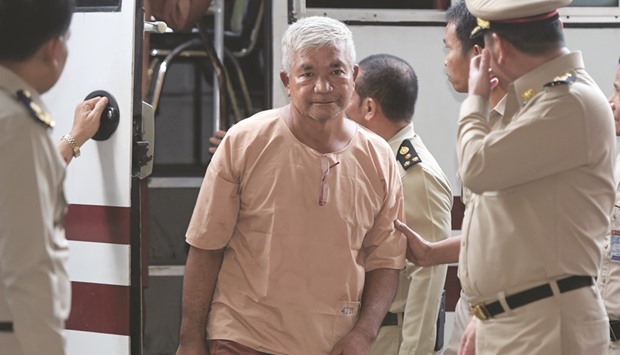Dozens of people including a general arrested in Thailand’s crackdown on human trafficking appeared in court yesterday to begin presenting their defence but journalists were barred from reporting trial proceedings.
The kingdom has long been a major hub for human trafficking and people-smuggling, with officials accused of turning a blind eye and even of complicity. Thailand’s junta launched a belated crackdown in 2015, a move that uncovered grim camps on the Thai-Malaysia border and led to dozens of arrests.
But it also led to the sudden closure of the trafficking route, leaving thousands of people —mainly Rohingya migrants from Myanmar and Bangladesh — abandoned by gangmasters on land and at sea.
More than 80 suspects, including local officials and senior army general Manas Kongpan, packed into a chamber at Bangkok’s main criminal court yesterday for the opening of their defence on an array of human trafficking charges. Reporters watched proceedings on a television screen in a side room. But they were told by court officials that any reporting of what was said at the trial had been banned since the start of proceedings last year. No reason was given for the decision.
Thailand’s generals seized power in 2014. Secret court hearings have since become more commonplace, particularly in military tribunals and for royal defamation prosecutions.
But it is rare for such restrictions to be placed on a criminal trial. The alleged involvement of senior military officers in the trade is an incendiary topic given that the ruling junta proudly shows off its anti-corruption credentials. “As a matter of basic judicial principles, trials should be public unless there is a very good reason why they’re not,” Sam Zarifi, Asia director for the International Commission of Jurists, told AFP.
The Thai Navy has sued reporters for investigations that alleged the complicity of their officers in human trafficking. Southern Thailand has long been known as a nexus for lucrative smuggling networks used by persecuted Rohingyas in Myanmar, and Bangladeshi economic migrants, on their way to Malaysia.
Many were held in pitiful jungle camps on the Thai-Malaysia border suffering beatings, rape and murder until relatives paid ransoms. Thailand’s image has been battered in recent years by a series of human trafficking scandals — including in its lucrative fishing and food production sectors. The junta has vowed to clean up the country’s image. But convictions have so far been few. In September a man was jailed for 35 years by a Thai court for masterminding a smuggling network. The defence is expected to end by March.

Lieutenant General Manus Kongpan (centre), suspected of involvement in human trafficking, arriving at the criminal court in Bangkok in this 2015 photo. Dozens of people including a general arrested in Thailand’s crackdown on human trafficking appeared in court yesterday to begin presenting their defence but journalists were barred from reporting trial proceedings.
